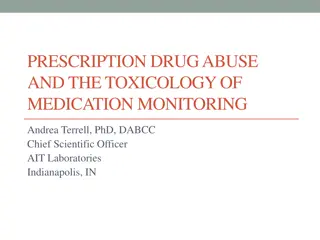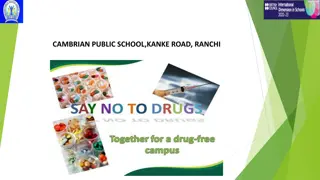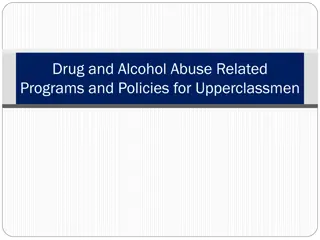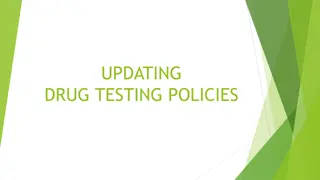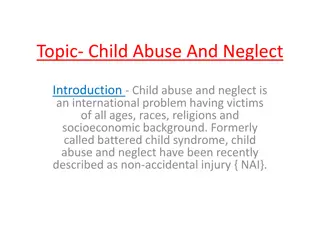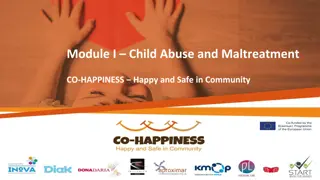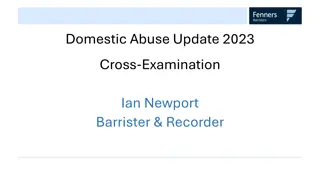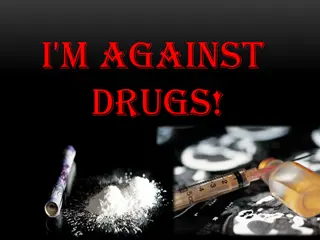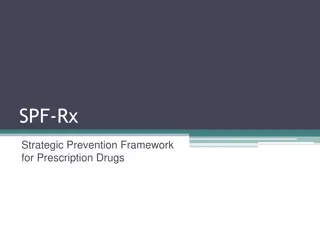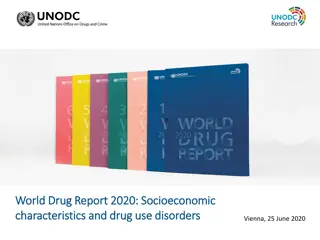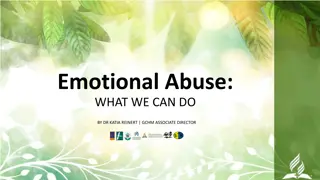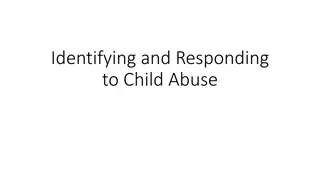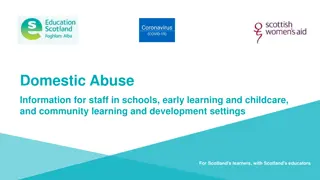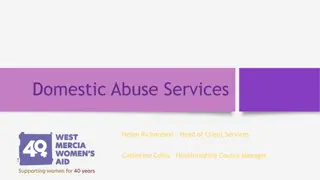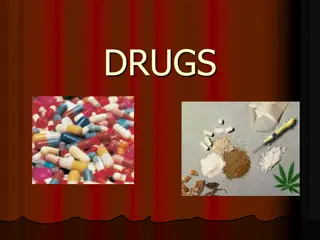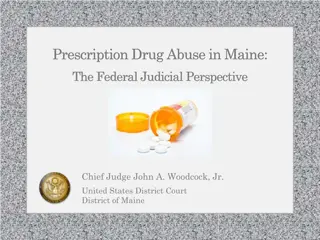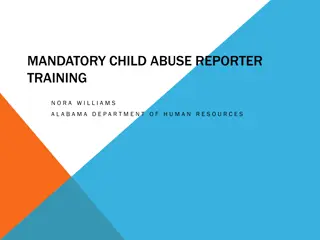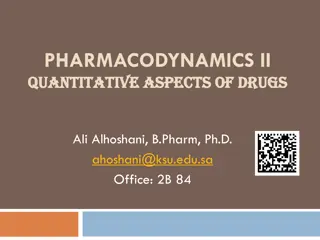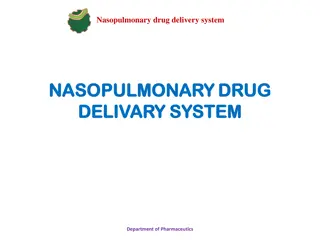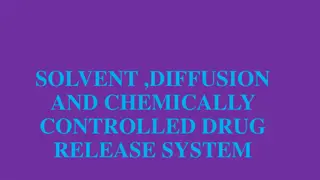Understanding Drug Abuse: Definitions, Effects, and Stages
Drug abuse is a serious issue involving various substances like prescription drugs, alcohol, and illegal drugs. This includes terms and definitions, effects on the body and mind, stages of addiction, and withdrawal symptoms. Factors influencing drug action and reasons for drug use are also explored. Understanding addiction stages like tolerance and dependence is crucial for recognizing and addressing drug abuse.
Download Presentation

Please find below an Image/Link to download the presentation.
The content on the website is provided AS IS for your information and personal use only. It may not be sold, licensed, or shared on other websites without obtaining consent from the author. Download presentation by click this link. If you encounter any issues during the download, it is possible that the publisher has removed the file from their server.
E N D
Presentation Transcript
Introduction to drug abuse Mrs. Basmah kattan, MPH
Outline Terms and definitions Gateway drugs Types of drugs Categories of drugs Addiction (activity) How Addiction Happens Factors That Influence Drug Action Why do people use drugs Symptoms of drug user How Drugs Are Taken Stages of addiction Exercise
Definitions Drug a substance that causes a physical or emotional change in a person. affects the processes of the mind or body; *Over-the-counter- (non-prescription) *Prescription Drugs Dr. written order *Tobacco*Alcohol*Illegal drugs* Herbal*Caffeine*Inhalants
Effect the influence a drug has on the body and the mind or both. Drug Use taking meds properly and in its correct dosage. Drug Misuse improper use of a drug (usually done by mistake) Drug abuse intentional improper use of a drug.
Psychoactive effects an effect on a person s mood or behavior. Mood-altering affects brain activity Overdose a serious sometimes fatal reaction to a large dose of a drug Dose an exact amount of a drug
o Tolerance: A stage of drug abuse in which the brain and body get used to a drug, causing a person to have to take more and more of the drug to get the same effect o Dependence: A stage of drug abuse in which a person needs a drug just to feel okay (normal).
Addiction A style of living characterized by compulsive use and overwhelming involvement with a drug. A stage of drug abuse in which the user cannot stop taking the drug despite serious negative consequences; the drug takes control of the brain and overpowers the body s natural signals Compulsive use of a drug despite any cost Changes the structure and chemistry of the brain
Withdrawal: A stage of drug abuse when the user stops taking the drug. The user is often in physical pain and may suffer from depression, hallucinations or delusions.
Other Drug Vocabulary Relapse the tendency to return to addictive behavior after a period of abstinence. Euphoria high Synesthesia an effect where sensory messages are incorrectly assigned (hear a taste, smell a sound) Flashbacks perceptual distortions and bizarre thoughts that occur after the drug has been eliminated from the body
What are gateway drugs? A gateway drug is a drug that opens the door to other, harder drug use. What are examples of gateway drugs? Alcohol, Tobacco, Marijuana
Types of Drugs Drugs can be separated into Types and Categories Types of Drugs: Prescription Drugs Over-the-Counter (OTC) Drugs Recreational Drugs alcohol, tobacco, caffeine Illicit Drugs Illegal Most are psychoactive changes brain chemistry
Categories of drugs Stimulants speed up the mental and physical responses of the central nervous system. Increase Heart Rate blood pressure breathing rate alertness
Depressants the opposite of stimulants, these drugs slow down brain and body reactions decreases heart and breathing rates lowers blood pressure Alcohol Barbiturates Sedatives Tranquilizers
Narcotics Powerful painkillers suppress the CNS. They have a high potential for abuse and addiction. Heroin OxyContin Codeine Vicodin Methadone Darvon
Hallucinogens distort sensory information going to the brain, while not all users hallucinate, have a distorted sense of reality. No medical use. LSD PCP MDMA Ecstasy Mushrooms = Also know as club drugs Rohypnol
Inhalants common household products. Chemical inhaled gives mind-altering effects.
Marijuana formally classified as both a hallucinogen and a depressant, marijuana and its derivatives are in a category all by themselves. Up to 20 times stronger than 30 years ago
Addiction Besides drugs what else could someone be addicted to?
Potato Chip Activity How does it feel to stop after just one chip? How many of you would like another chip? How do cravings for potato chips differ from cravings for tobacco, alcohol or other drugs? How might your body react if you stopped eating potato chips? What if you stopped using tobacco, alcohol, or some other drug after you are addicted?
How Addiction Happens Once a drug reaches the brain, it acts on one or more neurotransmitters, either increasing or decreasing their concentration and actions. Neurotransmitters include substances such as serotonin and dopamine that are released from your brain to make you feel good.
How quickly someone becomes addicted depends on several factors: Genetic connection to addiction Stress, worry, tension the more there is, the more likely you are to look for so-called relief. Drug being used. Some drugs cause addiction after just one or a few uses.
Factors That Influence Drug Action Dose Age Body Weight Gender Previous knowledge of drug Other drugs in body Contents of stomach Mood Expectations Environment
Why do people use drugs? Curiosity Peer pressure Peer acceptance Pleasure seeking Act of rebellion Boredom
Symptoms of a Drug User Personality Becomes disrespectful, verbal and physical abuse Is angry a lot, acts paranoid or confused, extreme mood swings Seems depressed and less out-going than usual. Is secretive, lies about what s/he is doing and where s/he is going. Steals or loses possessions s/he used to value. Seems to have a lot of money or is always asking for money
Symptoms of a Drug User Physical Appearance Not taking care of hygiene and grooming. Not sleeping or sleeping too much. Loss of appetite Weight loss or weight gain. Too hyperactive or too little energy.
Symptoms of a Drug User Social Activity/School Performance Drops old friends and activities. Skips school Loses interest in school work and is getting low grades Sleeps in class Loses concentration and is having trouble remembering things.
How Drugs Are Taken Inhaled Injection Orally Snorted Transdermal (Patches) Absorbed
Stages of Addiction Stage 1 curiosity is a motivator learning to trust/mistrust the drug used High is still a new feeling
Stages of Addiction Stage 2 User is thinking more about drugs Previous relationships become difficult User uses when alone User still thinks they have control
Stages of Addiction Stage 3 Seeks out the high Has confidence in using the drug User thinks the drug won t hurt them Peer group uses Tolerance develops
Stages of Addiction Stage 4 Can no longer get high User uses the drug to avoid being sick! Drugs become the center of their life
Tolerance, Dependence or Addiction? Does the scenario represent Tolerance, Dependence or Addiction?
Tolerance, Dependence or Addiction? Maha has to take twice as much heroin to get the same high she used to get with just one needle.
Tolerance, Dependence or Addiction? Rayan has a compulsive need to drink alcohol.
Tolerance, Dependence or Addiction? Ahmed will do anything, including steal from his friends to get the drugs.
Tolerance, Dependence or Addiction? The brain adjusts to the drug to the point that it needs the drug to function normally.
Tolerance, Dependence or Addiction? Sarah s reward pathway doesn t respond as strongly as it used to when she smokes a cigarette.
Tolerance, Dependence or Addiction? Saleh experiences overwhelming physical withdrawal symptoms when he doesn t take heroin.
Tolerance, Dependence or Addiction? Instead of a good feeling, taking the drug only produces relief.
Tolerance, Dependence or Addiction? The drug user s brain cells become more resistant to the effects of the drug.
Tolerance, Dependence or Addiction? Layla cannot control her cocaine use anymore.
Tolerance, Dependence, or Addiction 1. Tolerance 2. Addiction 3. Addiction 4. Dependence 5. Tolerance 6. Addiction 7. Dependence 8. Tolerance 9. Addiction


